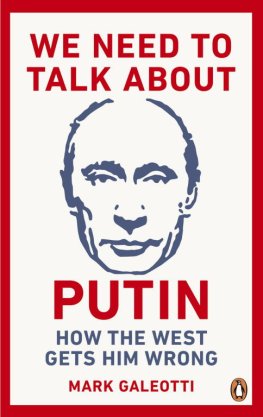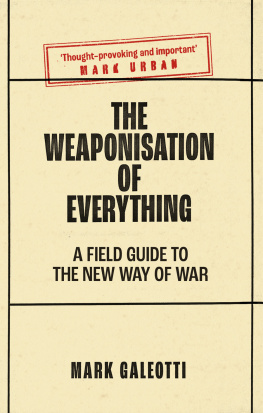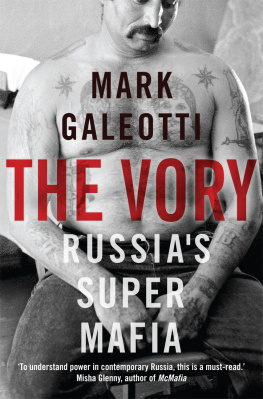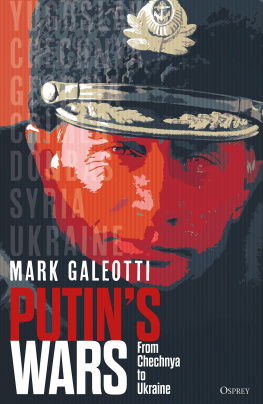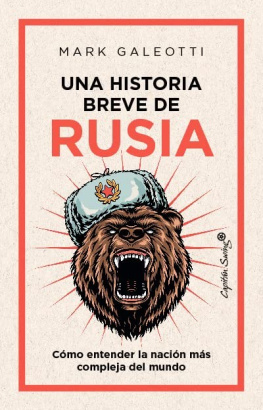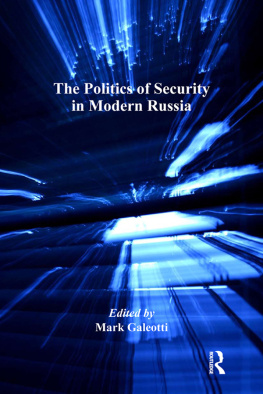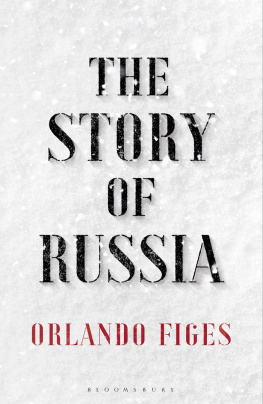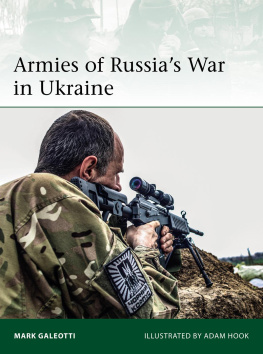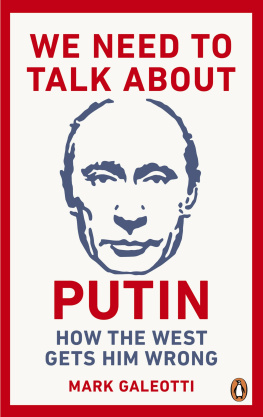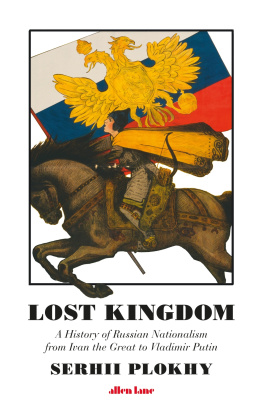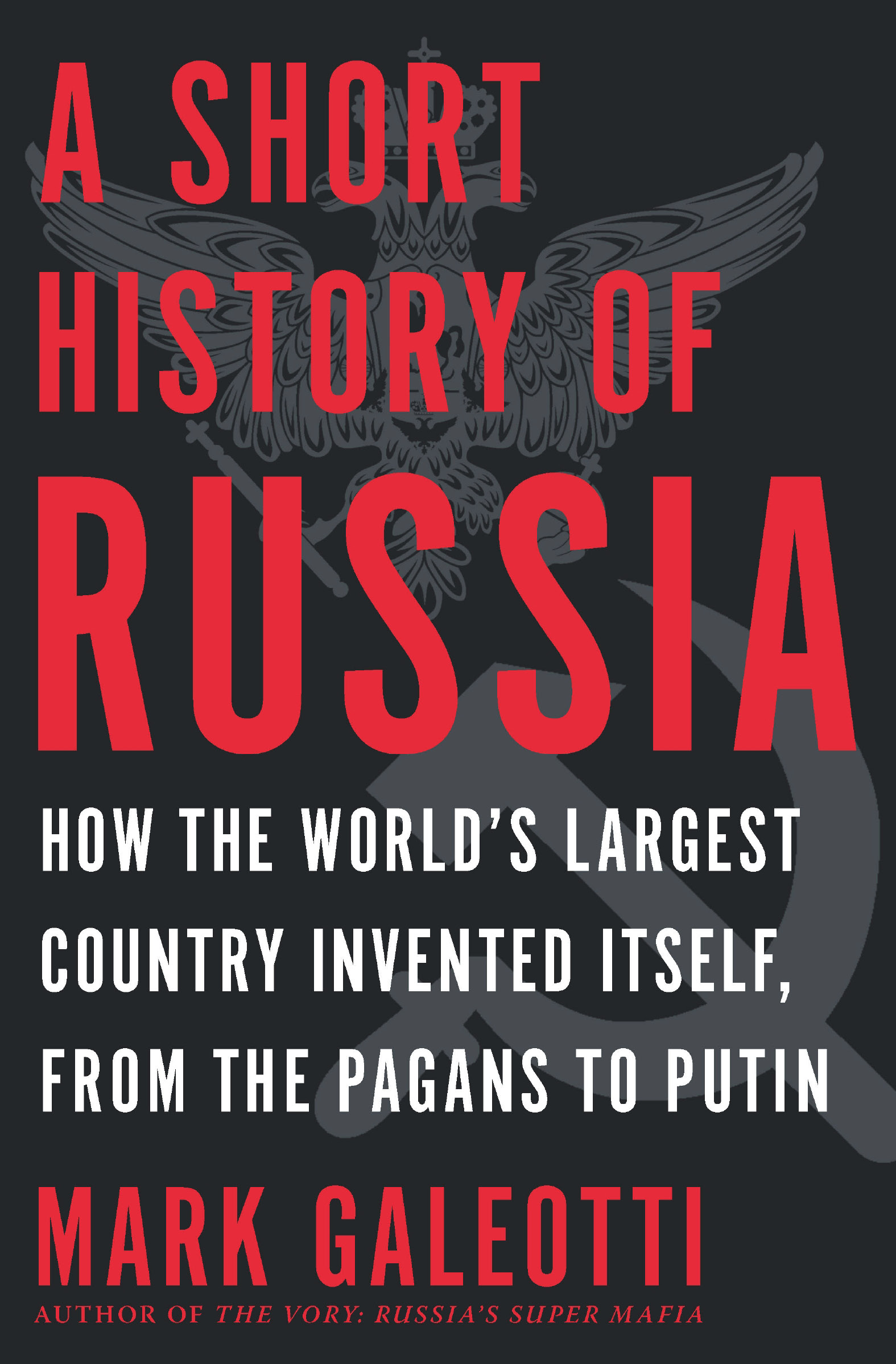
A concise and accessible telling of Russias dramatic story, its heroes and villains, triumphs and tragedies
Russia is a country with no natural borders, no single ethnic group, no true central identity. At the crossroads of Europe and Asia, it has been subject to invasion by outsiders, from Vikings to Mongols, from Napoleons French to Hitlers Germans. In order to forge an identity, it has mythologized its past to unite its people and to signal strength to outsiders.
In A Short History of Russia, Mark Galeotti explores the history of this fascinating, glorious, desperate and exasperating country through two intertwined issues: the way successive influences from beyond its borders have shaped Russia, and the way Russians came to terms with this influence, writing and rewriting their past to understand their present and try to influence their future. In turn, this self-invented history has come to affect not just their constant nation-building project but also their relations with the world.
Praise for Mark Galeottis previous books
Unlike most such accounts, Galeottis manages to completely overturn the conventional wisdom. The result is easily the shrewdest and most insightful analysis yet of Putins policymaking.
Foreign Affairs on We Need to Talk About Putin
Dynamic, authoritative and often witty.
The Scotsman on We Need to Talk About Putin
Galeotti sketches a bleak, but convincing picture of the man in the Kremlin and the political system that he dominates.
The Times (UK) on We Need to Talk About Putin
This book could not be more relevant.... Brilliant, gripping, astonishingly rich...filled with flamboyant gangsters, devious rackets, vicious hits, secret policemen, Kremlin leaders and criminal slang, at once a true-crime chronicle, a work of scholarship, an anthropological study, a political history of the fused underworld and upper echelons of Russian powerand essential reading.
Simon Sebag Montefiore, Evening Standard (UK), on The Vory: Russias Super Mafia
In these days of ever more bizarre Russian attacks, it reads like the essential companion to a bewildering and aggressive new world.
The Spectator (UK) on The Vory: Russias Super Mafia
The Vory is a timely, readable and important text for anyone thinking of ways to restrict Russian influence over the west.
Observer New Review (UK) on The Vory: Russias Super Mafia
Also by Mark Galeotti
Armies of Russias War in Ukraine
We Need to Talk About Putin: Why the West Gets Him Wrong, and How to Get Him Right
Russian Political War: Moving Beyond the Hybrid
Kulikovo 1380: The Battle That Made Russia
The Vory: Russias Super Mafia
The Modern Russian Army 19922016
Spetsnaz: Russias Special Forces
Russias Wars in Chechnya 19942009
Russian Security and Paramilitary Forces since 1991
Paths of Wickedness and Crime
Gorbachev and His Revolution
The Age of Anxiety: Security and Politics in Soviet and Post-Soviet Russia
Afghanistan: The Soviet Unions Last War
The Kremlins Agenda: The New Russia and Its Armed Forces
Mark Galeotti, honorary professor at UCL School of Slavonic and East European Studies, is one of the foremost Russia watchers today. Based in London, he is a senior associate fellow at the Royal United Services Institute and senior nonresident fellow at the Institute of International Relations Prague. Previously he has been professor of global affairs at New York University, head of the history department at Keele University in the UK, an adviser at the British Foreign Office and a visiting professor at MGIMO (Moscow), Charles University (Prague) and Rutgers (Newark). A prolific author on Russia and security affairs, he frequently acts as consultant to various government, commercial and law enforcement agencies.
A Short History of Russia
How the Worlds Largest Country Invented Itself, from the Pagans to Putin
Mark Galeotti
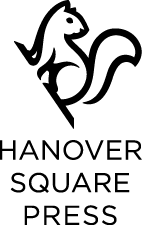
Contents
Russia is a country with a certain future; it is only its past that is unpredictable.
Soviet joke
INTRODUCTION
The oldest book in Russia does not speak with one voice. It roars and whimpers, mutters and moans, laughs and whispers, prays and brays, in progressively quieter tones. In July 2000, archaeologists excavating one of the oldest quarters of one of the oldest cities in RussiaNovgorod, once known as Lord Novgorod or Novgorod the Greatdiscovered three wooden boards, coated with wax, that together once were bound together as a book. According to carbon dating and other assessments, they were from somewhere between 988 and 1030 AD . Scratched onto the wax tablets are two psalms. This is a palimpsest, though, a document that has been used and reused, time after time, over decades, and yet on which the earlier writings are still just about visible. Painstaking work by the Russian linguist Andrei Zaliznyak uncovered a bewildering array of different writings once etched into the wax, thousands of them, from the Spiritual Instruction for the Son from a Father and a Mother to the beginning of the Apocalypse of John, a list of the Church Slavonic alphabet, even a treatise On Virginity.
This is wholly fitting.
Palimpsest People
Russia is a country with no natural borders, no single tribe or people, no true central identity. Its very scale astoundsit stretches across 11 time zones, from the European fortress-region of Kaliningrad, now cut off from the rest of the Motherland, all the way to the Bering Strait, just 82 kilometers (51 miles) from Alaska. Combined with the inaccessibility of many of its regions and the scattered nature of its population, this helps explain why maintaining central control has been such a challenge, and why losing that grip on the country such a terror for its rulers. I once met a (retired) KGB officer who admitted that We always thought it was all or nothing: either we held the country in a tight fist, or else it would all fall apart. I suspect his predecessors, from tsarist officers to early medieval princes, had much the same concernsand Putins officials, even with all the advances of modern communications, certainly do today.
Its position at the crossroads of Europe and Asia also means that Russia is everyones perennial other, with Europeans considering it Asian and vice versa. Its history has been shaped from without. It has been invaded by outsiders, from Vikings to Mongols, crusading Teutonic orders to the Poles, Napoleons French to Hitlers Germans. Even when not physically beset, it has been shaped by external cultural forces, forever looking beyond its borders for everything from cultural capital to technological innovation. It has also responded to its lack of clear frontiers by a steady process of expansion, bringing new ethnic, cultural and religious identities into the mix.
Russians are thus themselves a palimpsest people, citizens of a patchwork nation that more than most shows these external influences in every aspect of life. Their language is testament to this. A railway station is called a vokzal , for example, after Londons Vauxhall station, the result of an unfortunate translation mishap when an awestruck Russian delegation was visiting nineteenth-century England. At the time, though, the Russian elite spoke French, so they will nonetheless load their bagazh onto their kushet sleeper car. In Odessa, to the south, streets were named in Italian because that was the common trading language of the Black Sea; in Birobidzhan on the Chinese border, by contrast, the local language is still to this day Yiddish, from when Stalin sought to encourage Soviet Jews to resettle there in the 1930s. In the fortified kremlin of Kazan, there is both an Orthodox cathedral and a Muslim mosque, while shamans bless oil pipelines in the far north.
Next page

